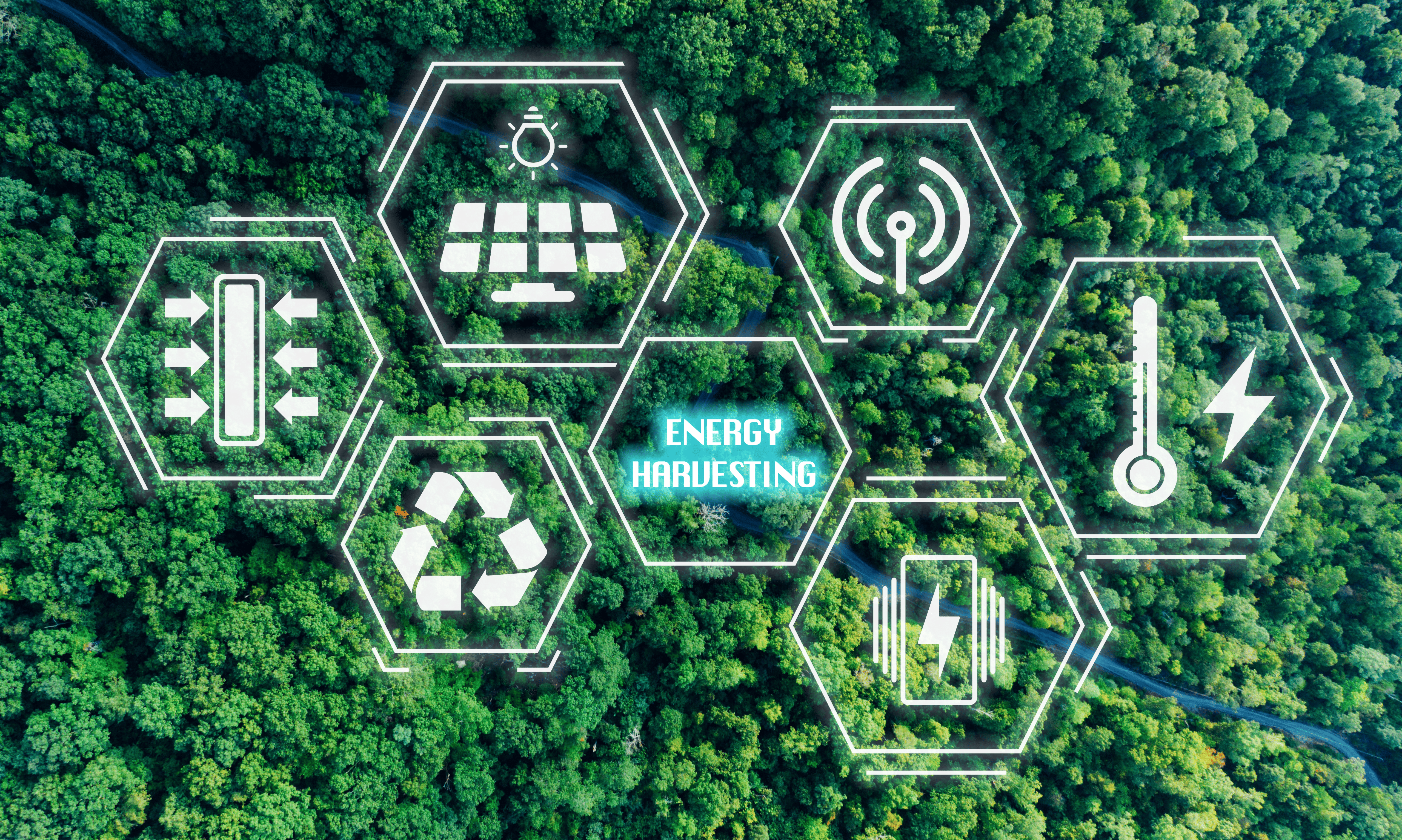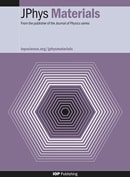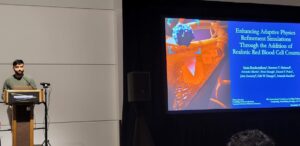Join the audience for a live webinar at 4 p.m. BST/8 a.m. PDT/8.30 p.m. IST/11.00 p.m CST on 26 September 2023, sponsored by the IOP Publishing journal, JPhys Materials, to explore the immense potential of ambient energy harvesting materials
Want to take part in this webinar?

Step into the future of clean energy with our upcoming webinar, where we explore the immense potential of ambient energy harvesting materials. Imagine a world where clean power is harnessed from our surroundings, anytime and anywhere, unlocking the path to achieving net-zero emissions. Join a panel of world-leading experts as they discuss a roadmap to advance energy harvesting materials, which enable us to convert waste energy from various sources into electricity. You will journey into the fascinating realms of photovoltaic, thermoelectric, piezoelectric, triboelectric, and radiofrequency energy harvesting, gaining new perspectives on the road ahead for these technologies to propel us towards a more sustainable future. Don’t miss this opportunity to be part of a captivating webinar that envisions a cleaner, greener world powered by the potential of energy harvesting materials.
Want to take part in this webinar?
Meet the esteemed panel of experts:

Vincenzo Pecunia is an associate professor and the head of the Sustainable Optoelectronics Research Group at Simon Fraser University (Canada). In 2009–2016, he earned his PhD in physics and was a postdoctoral researcher at the University of Cambridge (UK). His research covers printable semiconductors for optoelectronics and photovoltaics. A pioneer in lead-free-perovskite photovoltaics for self-powered printed electronics, his work features in top journals including Nature, Nature Electronics, Advanced Materials, and Advanced Energy Materials. He is a Fellow of the Institute of Materials, Minerals and Mining (FIMMM) and a Senior Member of the Institute of Electrical and Electronics Engineers (SMIEEE). He is an editorial board member for JPhys Materials and executive editorial board member for Nano Futures.
Thomas M Brown investigated polymer OLEDs for his PhD at the Cavendish Laboratory, University of Cambridge. From 2001–2005 he developed OTFTs and E-Paper as senior engineer with Plastic Logic Ltd. In 2005 he was recipient of a ‘‘re-entry’’ fellowship, awarded by the Italian Ministry of University and Research and is associate professor at Tor Vergata University of Rome. Founder and director of the Centre for Hybrid and Organic Solar Energy, and associate editor of Solar Energy, his current research focuses on perovskite solar cells for light harvesting in indoor environments, on a variety of flexible substrates, and on bio-hybrid devices.
Emmanuel Defay is the head of the Nanotech Unit at Luxembourg Institute of Science and Technology (70 researchers) since 2021, and the head of the Ferroic Materials for Transducers group (25 researchers) since 2014. His research interests are about materials able to transform one form of energy in another one, and, more specifically, in those related to electrical energy, such as piezoelectric micro-pumps, haptic actuators, mechanical or thermal energy harvesters or more recently electrocaloric solid-state coolers. His research lies between materials science, engineering and thermodynamics, all of them being required to create innovation in bringing these materials into realistic applications.
Zhong-Lin Wang is the director of the Beijing Institute of Nanoenergy and Nanosystems and Regents’ Professor and Hightower Chair at Georgia Institute of Technology. Wang pioneered the nanogenerators field for distributed energy, self-powered sensors and large-scale blue energy. Wang has received the Nano Research award (2022), Celsius Lecture Laureate, Uppsala University, Sweden (2020); The Albert Einstein World Award of Science (2019); Diels-Planck lecture award (2019); ENI award in Energy Frontiers (2018); The James C. McGroddy Prize in New Materials from American Physical Society (2014); and MRS Medal from Materials Research Soc. (2011). Wang was elected as a foreign member of the Chinese Academy of Sciences in 2009, member of European Academy of Sciences in 2002, academician of Academia of Sinica 2018, International fellow of Canadian Academy of Engineering 2019. Wang is the founding editor and chief editor of the international journal Nano Energy.
Mercouri Kanatzidis is a distinguished scientist and educator with a prolific career spanning over three decades. He is a professor of chemistry at Northwestern University. Mercouri has made ground-breaking discoveries and developed materials that have been instrumental in advancing alternative energy technologies. His work has focused on improving thermoelectric materials for waste heat recovery. With his team, he has developed the first solid-state solar cell device using a film of tin iodide perovskite. He has also mentored over 90 PhD students and nearly 120 postdoctoral fellows, helping to shape the next generation of scientists and engineers.
Thomas Anthopoulos is a professor of material science at King Abdullah University of Science and Technology (KAUST) in Saudi Arabia. He received his B.Eng. and D.Phil. degrees from Staffordshire University (UK). He then spent two years working on organic LEDs at the University of St. Andrews (UK) before joining Philips Research Laboratories (The Netherlands) to focus on soft electronics. From 2006 to 2017, he held faculty positions at Imperial College London (UK), first as an EPSRC advanced fellow and later as a professor of physics. His research interests include novel processing paradigms and the study and application of functional materials.
Taofeeq Ibn-Mohammed is enthusiastic about sustainability because it naturally unearths new discovery, innovation, and opportunities. He is an assistant professor of sustainable industrial ecosystems at WMG, University of Warwick. Before Warwick, he was a senior research fellow at the University of Sheffield and a visiting research scholar at the Materials Research Institute, Pennsylvania State University, USA. Taofeeq holds B.Eng., MSc, and PhD degrees in electrical/electronic, control systems, and energy systems engineering respectively. His research explores how interdisciplinary approaches from the fields of industrial ecology, sustainable systems engineering, and data science can be integrated to balance environmental, economic, and societal needs towards a sustainable future.
Vincenzo Pecunia et al 2023 J. Phys. Mater. 6 042501
With support from:
The School of Sustainable Energy Engineering (SEE) sits within Simon Fraser University’s Faculty of Applied Sciences. Its research and academic domain involves the development of solutions for the harvesting, storage, transmission and use of energy, with careful consideration of economic, environmental, societal and cultural implications.
JPhys Materials is a new open access journal highlighting the most significant and exciting advances in materials science.
Editor-in-chief: Stephan Roche, ICREA professor at the Catalan Institute of Nanosciences and Nanotechnology (ICN2) and the Barcelona Institute of Science and Technology.
- SEO Powered Content & PR Distribution. Get Amplified Today.
- PlatoData.Network Vertical Generative Ai. Empower Yourself. Access Here.
- PlatoAiStream. Web3 Intelligence. Knowledge Amplified. Access Here.
- PlatoESG. Automotive / EVs, Carbon, CleanTech, Energy, Environment, Solar, Waste Management. Access Here.
- PlatoHealth. Biotech and Clinical Trials Intelligence. Access Here.
- ChartPrime. Elevate your Trading Game with ChartPrime. Access Here.
- BlockOffsets. Modernizing Environmental Offset Ownership. Access Here.
- Source: https://physicsworld.com/a/powering-the-future-clean-energy-anywhere-anytime-through-energy-harvesting-materials/
- :has
- :is
- :where
- ][p
- 2005
- 2006
- 2011
- 2014
- 2017
- 2018
- 2019
- 2020
- 2021
- 2022
- 2023
- 25
- 26%
- 30
- 70
- a
- a.m
- Able
- About
- Academia
- academic
- Academy
- access
- achieving
- advance
- advanced
- advances
- advancing
- ahead
- All
- also
- alternative
- Ambient
- American
- an
- and
- andrews
- Another
- anywhere
- Application
- applications
- applied
- approaches
- ARE
- AS
- Assistant
- Associate
- At
- audience
- award
- awarded
- Balance
- barcelona
- BE
- because
- been
- before
- Beijing
- being
- between
- Blue
- board
- board member
- Bringing
- brown
- by
- cambridge
- CAN
- Canada
- Canadian
- captivating
- Career
- careful
- Cells
- Celsius
- centre
- Chair
- chemistry
- chief
- chinese
- clean energy
- cleaner
- click
- College
- consideration
- control
- convert
- Covers
- create
- cultural
- Current
- data
- data science
- decades
- developed
- Development
- device
- Devices
- Director
- discovery
- discuss
- Distinguished
- distributed
- domain
- Dont
- earned
- Economic
- Ecosystems
- editor
- Editorial
- einstein
- elected
- electricity
- Electronics
- Emissions
- enable
- energy
- engineer
- Engineering
- Engineers
- enthusiastic
- environmental
- environments
- envisions
- esteemed
- European
- exciting
- executive
- experts
- explore
- explores
- fascinating
- Features
- fellow
- field
- Fields
- Film
- First
- flexible
- Focus
- focused
- focuses
- For
- foreign
- form
- founder
- founding
- from
- Frontiers
- functional
- future
- gaining
- generation
- Georgia
- ground-breaking
- Group
- haptic
- Harvesting
- Have
- he
- head
- Held
- helping
- highlighting
- his
- holds
- How
- HTML
- HTTPS
- Hybrid
- image
- imagine
- immense
- Imperial
- Imperial College
- Imperial College London
- implications
- improving
- in
- include
- Indoor
- industrial
- information
- Innovation
- Institute
- instrumental
- integrated
- interests
- International
- into
- issue
- IT
- italian
- ITS
- james
- join
- joining
- journal
- journey
- jpg
- King
- laboratory
- large-scale
- later
- Lecture
- leds
- lies
- light
- live
- logic
- London
- Ltd
- Luxembourg
- made
- material
- materials
- max-width
- mechanical
- member
- minerals
- Mining
- ministry
- more
- most
- nano
- nanotechnology
- Nature
- nearly
- needs
- net-zero
- Netherlands
- New
- next
- novel
- of
- on
- ONE
- open
- opportunities
- Opportunity
- or
- organic
- our
- over
- panel
- part
- path
- Pennsylvania
- perspectives
- phd
- PHIL
- physical
- Physics
- Physics World
- pioneer
- pioneered
- plastic
- plato
- Plato Data Intelligence
- PlatoData
- positions
- potential
- power
- powered
- Powering
- prize
- processing
- Professor
- Propel
- Publishing
- realistic
- realms
- received
- recently
- recovery
- related
- required
- research
- researcher
- researchers
- respectively
- right
- road
- roche
- rome
- Saudi
- Saudi Arabia
- Scholar
- Science
- Science and Technology
- SCIENCES
- Scientist
- scientists
- see
- Semiconductors
- senior
- sensors
- September
- Shape
- significant
- Simon
- since
- sits
- societal
- Society
- Soft
- solar
- Solar cells
- solar energy
- Solutions
- Sources
- spanning
- specifically
- spent
- Sponsored
- State
- storage
- Students
- Study
- such
- support
- Sustainability
- sustainable
- Sustainable Energy
- sustainable future
- Sweden
- Systems
- Take
- team
- Technologies
- Technology
- that
- The
- The Future
- the Netherlands
- Them
- then
- thermal
- These
- they
- this
- those
- three
- Through
- thumbnail
- to
- top
- Tor
- towards
- Transform
- two
- Uk
- unit
- university
- university of cambridge
- unlocking
- upcoming
- us
- USA
- use
- using
- variety
- various
- was
- Waste
- waste heat recovery
- we
- webinar
- which
- will
- with
- within
- Work
- working
- world
- years
- You
- zephyrnet














